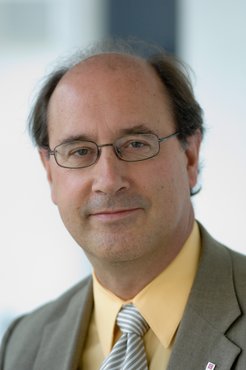Prof. Bernard Schutz, one of the fathers of gravitational wave astronomy, is 60
Bernard Schutz, Director at the Max Planck Institute for Gravitational Physics (Albert Einstein Institute) in Potsdam, celebrates his 60th birthday on August 11. The gravitational physicist enjoys an outstanding reputation worldwide due to his scientific activities, his publications, his personal commitment to the interests of gravitational physics and its scientists.
“Bernard has been and still is the linchpin for a fruitful collaboration between theoretical and experimental astrophysicists in Europe and the USA. He played a decisive role in the founding of the research field of gravitational wave astronomy, which is now undoubtedly one of the most forward-looking research fields with the commissioning of the German-British gravitational wave detector GEO600, the American LIGO detectors, the Italian VIRGO detector and, in the near future, the space project “LISA”,” says Prof, James Hough, Director at the Institute for Gravitational Research at the University of Glasgow/Scotland and a long-standing companion of Schutz'.

Bernard Schutz is particularly closely associated with Albert Einstein and Potsdam: Albert Einstein's theories inspired him so much that he was determined to become a physicist at the age of 17. He studied physics at Clarkson University (State of New York/USA) in Potsdam (!). Together with a group of scientists at the California Institute of Technology (CalTech) he became aware of the importance of gravitational waves, which were an important prediction of Einstein's general relativity theory, as early as the late 1960s. Since then, Bernard Schutz has been investigating the effects of general relativity on astrophysics. Due to his work in the field of theoretical astrophysics - including the calculation of gravitational wave signals and data evaluation of gravitational wave detectors - he is one of the leading international experts in the field of general relativity.
As founding director (together with Prof. Dr. Jürgen Ehlers), Schutz has been heading the fortunes of the Max Planck Institute for Gravitational Physics (Albert Einstein Institute) in Potsdam since the beginning in 1995. Within the institute, he heads the Department of Astrophysical Theory of Relativity, which deals with mathematical simulations of general relativity and studies of black holes and gravitational waves. He is also Professor at the Department of Physics and Astronomy, University of Wales in Cardiff. Together with two other scientists, Schutz is leading the work on the German-British gravitational wave detector GEO600 and is a member of the international scientific team of LISA (Laser Interferometer Space Antenna): a forward-looking joint project of ESA and NASA which is to detect gravitational waves in space from 2015 onwards. Bernard Schutz has also made it his mission to make gravitational physics, from Galileo to Newton and Einstein and current research, accessible to the general public. His book “Gravity from the ground up”, published by Cambridge, is a good example of this.
Due to his outstanding scientific pioneering work, especially in the field of gravitational physics, Bernard Schutz has received several awards. For example, he has just been appointed a member of the “German Academy of Natural Scientists Leopoldina”, is a member of the "Royal Academy of Arts and Sciences", Uppsala/Sweden, and a fellow of the American Physical Society. In September he will also receive the “Amaldi Medal” of the “Italian Society for Gravitational Research”.








